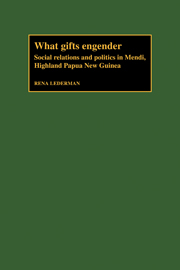Book contents
- Frontmatter
- Contents
- List of tables, figures, and maps
- Preface
- Acknowledgments
- 1 Mendi coming into view
- 2 Sem relations: solidarity and its limits
- 3 Twem: personal exchange partnerships
- 4 Gender ideology and the politics of exchange
- 5 Twem and sem in context
- 6 Sai le at Senkere: the politics of a Pig Festival
- 7 “Development” in Mendi
- Appendix A The research community
- Appendix B The “accounts sample” and some comments on research methodology
- Notes
- Glossary
- References
- Index
7 - “Development” in Mendi
Published online by Cambridge University Press: 04 August 2010
- Frontmatter
- Contents
- List of tables, figures, and maps
- Preface
- Acknowledgments
- 1 Mendi coming into view
- 2 Sem relations: solidarity and its limits
- 3 Twem: personal exchange partnerships
- 4 Gender ideology and the politics of exchange
- 5 Twem and sem in context
- 6 Sai le at Senkere: the politics of a Pig Festival
- 7 “Development” in Mendi
- Appendix A The research community
- Appendix B The “accounts sample” and some comments on research methodology
- Notes
- Glossary
- References
- Index
Summary
Tone, a young man, commenting on the relative value of money and pearl shells: “… money is better [than pearl shells] this way: You can get more things with money than with pearl shells; money is stronger. Money isn't heavy, and it isn't so big that when you give it to someone everyone can see how much you gave. Shells you have to give in the open. Money you can hide in your hand. With shells people have more to talk and argue about.”
Nare, a leader, toward the end of a discussion about whether pearl shells will ever be abandoned in Mendi: “Pearl shells will not be abandoned. When one holds a pearl shell in one's hand, one feels that it is heavy, or “right” [momak kilponge kendpi]. There is no pleasure in displaying and counting money the way there is with pearl shells.…. When people think only of food, when they all hold pencils in their hands and work for money, then all [our former practices] will go. This is not true yet. Later people will still arrange kowar when their relatives die; only with money. No one will organize the large clan festivals anymore. But everyone does not yet go to school. When they do, then pearl shells will go.”
Introduction
The research on which this study is based was motivated initially by a question about the relationship between the intensity of production and political structure.
- Type
- Chapter
- Information
- What Gifts EngenderSocial Relations and Politics in Mendi, Highland Papua New Guinea, pp. 213 - 237Publisher: Cambridge University PressPrint publication year: 1986



